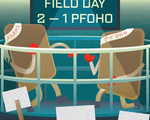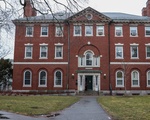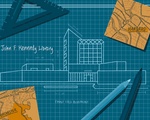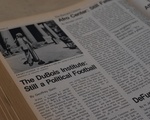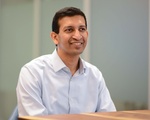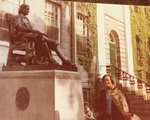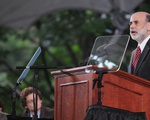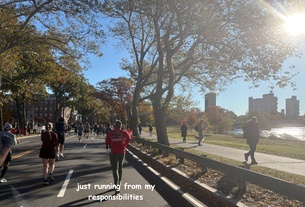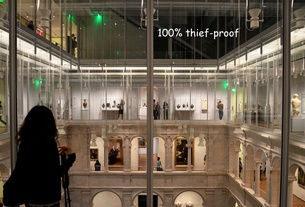Reunions
Napster Sparks Debate About Music Piracy at Harvard
When Napster was founded in May 1999, students across the country jumped at the opportunity to download their favorite music without the hassle of buying a new CD. But for universities, the novel technology posed a new problem: legal threats from the music industry.
The Strauch Committee Considers Equal Admissions for Women
The Strauch Committee — tasked with determining whether to combine the Harvard-Radcliffe admissions offices and deciding whether to continue to enforce gender ratios in admissions — released its final report in 1975.
The Class That Went Online: Harvard’s Class of 2000 Plugs In
In 1995, a faculty committee called for every staff and faculty member to have access to a computer and the internet, just in time for the arrival of the Class of 2000 on campus.
The Adams-Pfoho Dining Hall War of 1999
Pranks, public shaming, football, drag, and a high-stakes tug-of-war game: A clash over lunch access sparked a memorable House rivalry for the Class of 2000.
Service and Action: PBHA Becomes Political
Since its founding in 1904, the PBHA has served as Harvard’s flagship service organization — a place where students could give back to their city through volunteer work. In 1975, the PBHA expanded its mandate, inflected with the era’s activist ethos.
How Harvard Lost the JFK Library
In 1963, one month before his assassination, President John F. Kennedy ’40 visited Harvard to choose a site for his presidential library and archives. But after years of local controversy, the JFK library at Harvard never came to be.
The Battle Over the Du Bois Institute
The Du Bois Institute, Harvard’s premier research center for African American studies, was born amid a protracted struggle over the structure of the Afro-American studies department.
‘This Could Happen to My Friend’: How the Diallo Shooting Galvanized Harvard Students Against Police Brutality
On Feb. 4, 1999, four New York Police Department officers fired 41 shots at Amadou Diallo, an unarmed West African immigrant. More than a year later, the four officers were acquitted of all charges — and Harvard students refused to stay silent.
‘The Michael Jordan of Whatever He Did’: How Raj Chetty ’00 Reshaped Economics
Before Chetty was an economics wunderkind whose work on social mobility shot him to stardom, he was a talented undergraduate, laser-focused on his economics work — and his beloved Chicago Bulls.
From the Gridiron to the Lab: Christopher Nowinski’s Journey
When former Harvard football player Christopher J. Nowinski ’00 first set foot on campus, he had no idea that the hits he took on the field could cause permanent brain damage. Twenty-five years after his graduation, Nowinski’s ground-breaking work on concussions is paving the way for a safer future.
When Bill Gates Wrote Microsoft’s First Code on a Harvard Mainframe
Bill Gates arrived at Harvard College in September 1973 as a quiet freshman from Seattle in Wigglesworth Hall. He left campus two years later not with a degree, but with a piece of software that would launch Microsoft and begin reshaping the digital landscape.
‘Be Here Now’: Inside Harold Koh’s Journey From Pinball to Politics
Harold H. Koh started at Harvard as a Physics concentrator — before he went on to become dean of Yale Law School and an advisor to Barack Obama’s State Department.
How Fed Chair Ben Bernanke ’75 Discovered Economics at Harvard
As a still-undecided sophomore, Ben S. Bernanke ’75 did what hundreds of Harvard students have done for decades: enroll in Economics 10, the school’s introductory economics course sequence. The decision would launch him on his path to leading the Federal Reserve.
‘Hilarious, Mesmerizing, Spellbinding’: Class of 1975 Recalls Muhammad Ali’s Sold-Out Speech
The Class of 1975 invited Ali to speak at the annual Class Day celebration after Mel Brooks and Bill Cosby declined invitations. Ali was able to work Harvard into his calendar — and delivered a speech that many undergrads recalled decades later.
The Fall of Harvard’s Global Development Powerhouse
For nearly three decades, the Harvard Institute for International Development advised foreign governments on some of their most pressing economic and political issues. Then, in 2000, it was shuttered amid scandal.






